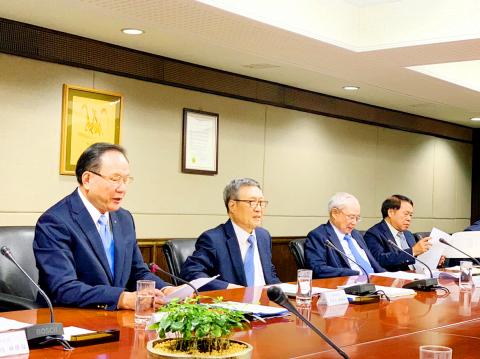Formosa Plastics Group’s (FPG, 台塑集團) four major subsidiaries yesterday reported lower sales for last month as a result of falling prices and declining demand.
Formosa Petrochemical Corp (FPCC, 台塑石化) saw shipments of refined petroleum products increase 1,135 barrels from a year earlier, but its revenue still declined 9.02 percent annually to NT$57.07 billion (US$1.81 billion) although it was up 3.11 percent from June, as crude oil prices remained low, FPCC president Tsao Minh (曹明) told a media briefing in Taipei.
Revenue for this quarter is expected to be better than last quarter on the back of increasing demand for both oil and olefin products ahead of holiday seasons and the steady spreads of oil products, Tsao said.

Photo: Chang Hui-wen, Taipei Times
Nan Ya Plastics Corp’s (南亞塑膠) revenue dropped 13.6 percent year-on-year to NT$24.56 billion, as the prices of two of its main chemical products plunged, with ethylene glycol down 40.5 percent and bisphenol-A down 38 percent, Nan Ya chairman Wu Chia-chau (吳嘉昭) said.
However, revenue increased 11.7 percent over June’s, he said.
“Sales for this month are expected to be slightly higher than last month on the back of higher demand for electronic materials as China speeds up the construction of 5G base stations,” Wu said.
Revenue for this quarter would be flat from last quarter, as most customers remain conservative about their business, he said.
The company’s electronics materials business is expected to benefit from a growing trade spat between Japan and South Korea, despite uncertainties in market demand, he added.
Formosa Plastics Corp (FPC, 台塑), the group’s flagship unit, reported that revenue dropped 10.18 percent annually to NT$17.51 billion, due to falling spreads of its plastic products and sliding prices of its products, FPC president and chairman Jason Lin (林健男) said.
That is 4.59 percent lower than June’s total.
FPC expects revenue for this quarter to be lower than last quarter as its utilization rate would decline 4 percentage points to 89 percent, but product prices would bounce back thanks to annual maintenance at competitors’ manufacturing sites.
Formosa Chemicals & Fibre Corp (FCFC, 台灣化學纖維) saw its revenue fall 19.94 percent to NT$27.46 billion, mainly due to annual maintenance at its plants in Yunlin County’s Mailiao Township (麥寮), but that was 6.53 percent more than June’s figure, FCFC vice chairman Hong Fu-yuan (洪福源) said.
The company expects low demand for polyester products, as its utilization rate for its polyester business remains at 62.63 percent this month, compared with about 80 percent last year, he said.
Revenue for this quarter is expected to be slightly lower than last quarter, as the US’ new tariffs on Chinese imports would lower clients’ demand during the peak season and product prices would remain low, he said.

NOT JUSTIFIED: The bank’s governor said there would only be a rate cut if inflation falls below 1.5% and economic conditions deteriorate, which have not been detected The central bank yesterday kept its key interest rates unchanged for a fifth consecutive quarter, aligning with market expectations, while slightly lowering its inflation outlook amid signs of cooling price pressures. The move came after the US Federal Reserve held rates steady overnight, despite pressure from US President Donald Trump to cut borrowing costs. Central bank board members unanimously voted to maintain the discount rate at 2 percent, the secured loan rate at 2.375 percent and the overnight lending rate at 4.25 percent. “We consider the policy decision appropriate, although it suggests tightening leaning after factoring in slackening inflation and stable GDP growth,”

DIVIDED VIEWS: Although the Fed agreed on holding rates steady, some officials see no rate cuts for this year, while 10 policymakers foresee two or more cuts There are a lot of unknowns about the outlook for the economy and interest rates, but US Federal Reserve Chair Jerome Powell signaled at least one thing seems certain: Higher prices are coming. Fed policymakers voted unanimously to hold interest rates steady at a range of 4.25 percent to 4.50 percent for a fourth straight meeting on Wednesday, as they await clarity on whether tariffs would leave a one-time or more lasting mark on inflation. Powell said it is still unclear how much of the bill would fall on the shoulders of consumers, but he expects to learn more about tariffs

Greek tourism student Katerina quit within a month of starting work at a five-star hotel in Halkidiki, one of the country’s top destinations, because she said conditions were so dire. Beyond the bad pay, the 22-year-old said that her working and living conditions were “miserable and unacceptable.” Millions holiday in Greece every year, but its vital tourism industry is finding it harder and harder to recruit Greeks to look after them. “I was asked to work in any department of the hotel where there was a need, from service to cleaning,” said Katerina, a tourism and marketing student, who would

i Gasoline and diesel prices at fuel stations are this week to rise NT$0.1 per liter, as tensions in the Middle East pushed crude oil prices higher last week, CPC Corp, Taiwan (台灣中油) and Formosa Petrochemical Corp (台塑石化) said yesterday. International crude oil prices last week rose for the third consecutive week due to an escalating conflict between Israel and Iran, as the market is concerned that the situation in the Middle East might affect crude oil supply, CPC and Formosa said in separate statements. Front-month Brent crude oil futures — the international oil benchmark — rose 3.75 percent to settle at US$77.01